UN Conference on the Rights of Persons with Disabilities
ALLFIE’s Interim Director, Michelle Daley, went to the Conference of States Parties on the UN Convention on the Rights of Persons with Disabilities. As well as an important event, this proved to be a fascinating and worthwhile one – with a wheelchair protest.
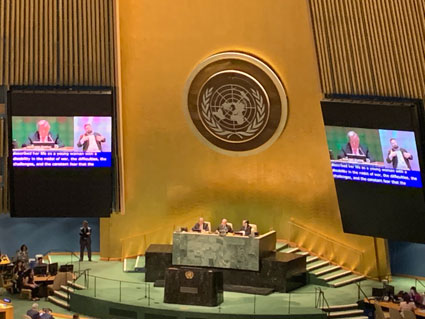
The Conference of States Parties (COSP) was held at the United Nations Headquarters in New York over 10 – 13 June. This was the 12th session and its focus was on the UN Convention on the Rights of Persons with Disabilities (UNCRPD). I attended as part of the Reclaiming Our Futures Alliance (ROFA) delegation, of which ALLFIE is a member. ROFA delegates were fresh from the UK Disability and International Development and Cooperation event, which proved to be an ideal launchpad for this.
The first day of the conference was the Civil Society Forum, hosted by International Disability Alliance (IDA). This provided a platform for DPOs to share and discuss their experiences. The forum felt very positive, with some clear messages about the future of DPOs:
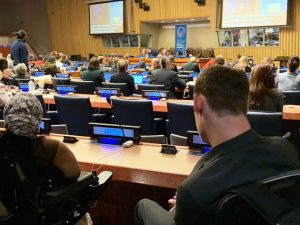
- DPOs must engage at grassroots level with Disabled young people because they are our next leaders.
- DPOs need to be properly resourced with core funding.
- There is a greater need for capacity building across all sectors to help with the implementation of UN CRPDs and Sustainable Development Goals.
- We were reminded that children without parents have rights, and institutions are not sustainable.
- Findings from a survey carried out by IDA were highlighted, which showed that a majority of DPOs are disappointed with the governments of their countries.
- More work is required to achieve inclusive education, gender equality and Independent living.
Wheelchair users denied access to the opening of the COSP
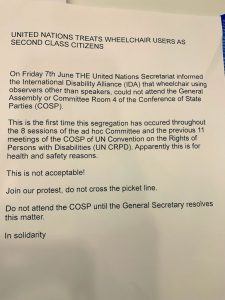 In the closing remarks of the Civil Society Forum delegates were informed that it had been decided that wheelchair users would be denied access to the opening of the COSP in the General Assembly and level four of the seating area because of seating arrangements and health and safety. To add further insult, wheelchair users were told that we could watch the opening from a screen.
In the closing remarks of the Civil Society Forum delegates were informed that it had been decided that wheelchair users would be denied access to the opening of the COSP in the General Assembly and level four of the seating area because of seating arrangements and health and safety. To add further insult, wheelchair users were told that we could watch the opening from a screen.
As you can imagine this announcement was not positively received and was slated as the highest level of hypocrisy by the UN.
Immediately the mood changed. Disabled people swiftly mobilised, a petition was written and circulated and protest organised. The following morning the protest went into action. Disabled people gathered in the reception area of the UN headquarters to speak out. Adding to the UN’s embarrassment the protest was shared on social media.
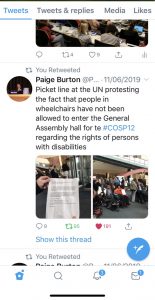 Through mobilisation and solidarity we as Disabled people disrupted the COSP and embarrassed the UN for their discriminatory practice in denying wheelchair users attendance at one of the most significant meetings about our lives. It was crucial that we showed the UN this was unacceptable behaviour and demonstrated double standards. The mantra of “Nothing About Us Without Us” was really put into action here and we saw the power and fearlessness of Disabled people in pushing for inclusion and human rights. This protest sent a clear message throughout the COSP but also to the rest of the world that it is not acceptable to segregate us, and that implementing decisions that discriminate against us is not just wrong but inhuman.
Through mobilisation and solidarity we as Disabled people disrupted the COSP and embarrassed the UN for their discriminatory practice in denying wheelchair users attendance at one of the most significant meetings about our lives. It was crucial that we showed the UN this was unacceptable behaviour and demonstrated double standards. The mantra of “Nothing About Us Without Us” was really put into action here and we saw the power and fearlessness of Disabled people in pushing for inclusion and human rights. This protest sent a clear message throughout the COSP but also to the rest of the world that it is not acceptable to segregate us, and that implementing decisions that discriminate against us is not just wrong but inhuman.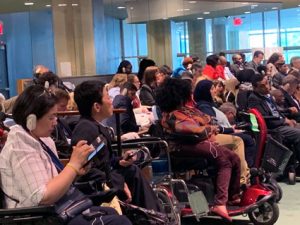
The conference – discussion on implementation of UNCRPD
The COSP was made up of both conference and side events on aspects of implementing the UNCRPD. It was designed to give people the chance to learn and focus on different areas of personal interest.
Over the four days I attended a range of side events on education, independent living, technology, representation & intersectionality, young people and unified voice. I also attended the relaunch of the Commonwealth Disabled People’s Forum which was held on the closing day of the COSP. The Forum will address issues around representation, reparations and colonialism.
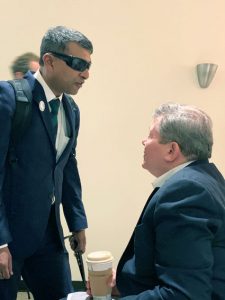
Coming out of the conference were some important messages relevant to ROFA:
- We were reminded that under UNCRPD Article 24, General comment number 4 means all children learning in the same school and classroom.
- We also learnt from Canada that they have intersectionality in law but this is yet to be tested. Is this something the UK needs to be calling for?
- In relation to our domestic issues around the horrific abuse of older people and people with learning difficulties in care homes, the conference shared our sentiments that institutions are not a ‘home’ and people should be supported to live in their own home within the community. An institution is a pseudo home and not an actual home.
- There were concluding observations that there is still a huge amount of work globally to be done around inclusive education.
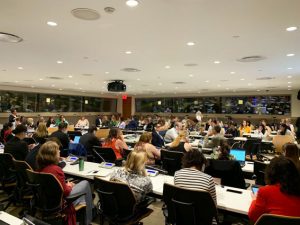
The lack of representation of Disabled young people under 20 was disappointing, reflecting the above point about the need to nurture Disabled young people as our next leaders. There was further poor representation from people with learning difficulties. Representation is something that we know all countries struggle with but those such as Australia, Britain, Canada, New Zealand and European nations need to be held to account with the same emphasis as others, particularly on race.
Domestically DPOs will welcome the conference’s message that DPOs must be the drivers for implementation of the UNCRPD as this is the only way we will achieve our human rights and full inclusion.
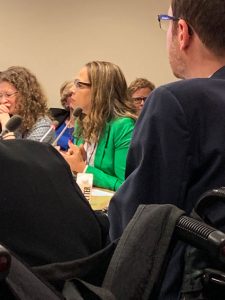
Many countries but one message
It became apparent from the global presence of Disabled people – which we are not usually accustomed to – that there is something beautiful and unique about the UNCRPD. It is an international instrument based on universal rights, it provides a common interest based on the social model of disability and it recognises the intersectionality of Disabled people.
The COSP is a very different platform from other meetings. It is about the ambition to fulfil the UNCRPD and the understanding that do so requires shared learning and knowledge at a global level. It certainly reinforced the importance of representing the UK Disabled people’s movement internationally and joining our Disabled sisters and brothers in political and legal campaign work for our human rights. The universality of our experiences and the need for solidarity were perfectly articulated by the newly appointed Chairwoman of the Commonwealth Disabled People’s Forum Rachel Kachaje from Malawi who commented that no matter where we live in the world Disabled people share the same experiences.
In solidarity!
Michelle Daley
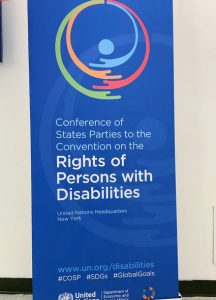
![Allfie [logo]](https://www.allfie.org.uk/wp-content/themes/allfie-base-theme/assets/img/allfie-logo-original.svg)




Discussion
There is one comment.
Comment by Leonardo Steenkamp
Hi, reading this article was very insightful. It begged the following question-Where is my country South Africa in all of that is happening?
What have we as a country done to foster inclusive education as it is highlighted here?
I think we as a country have much to learn in this regard.